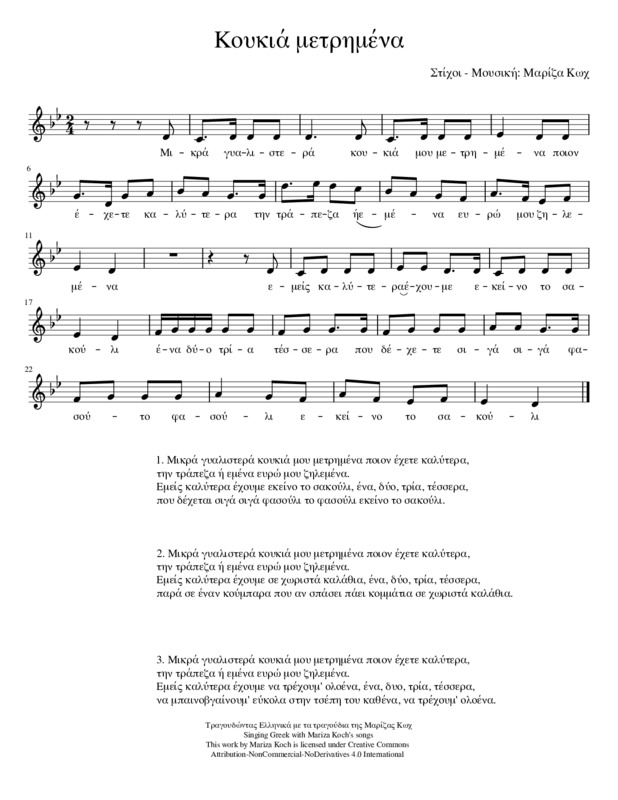
Koukia metrēmena

Koukia metrēmena
Pronunciation
Distinction of τρ (/tr)/ and κρ (/kr/) clusters: "μετρημένα" (metrēmena, counted), "τράπεζα" (trapeza, bank), "τρία" (tria, three), "τρέχουμε" (trechoume, we run), "μικρά" (mikra, small).
Speech Comprehension and Production
Metaphor-literal meaning ["κουκιά μετρημένα" (koukia metrēmena)] - study the linguistic patterns denoting metaphor.
Refer to the proverb "Φασούλι το φασούλι γεμίζει το σακούλι" (Phasouli to phasouli gemizei to sakouli, Look after the pennies and the pounds will look after themselves) that indicates the importance of savings.
The song deals with the various beliefs regarding money management (savings - fair distribution of money - consumption). The pupils are invited to briefly write down their own point of view on the subject.
Expressive pattern of question-answer format found in Greek folk songs (dēmotika tragoudia), such as "Ο Μανούσης" (O Manousēs), "Έλα βρε Χαραλάμπη" (Ela vre Charalampē), "Μ'αγαπάς Γαρουφαλίτσα;" (M'agapas Garouphalitsa?). Expressive pattern of repetition: A sentence is repeated at the beginning of two or more sentences i.e. "Μικρά γυαλιστερά κουκιά μου μετρημένα ποιον έχετε καλύτερα, την τράπεζα ή εμένα ευρώ μου ζηλεμένα" (Mikra gyalistera koukia mou metrēmena poion echete kalytera, tēn trapeza ē emena eurō mou zēlemena).
Expression "δεν δίνει ούτε τ'αγγέλου του νερό" (den dinei oute t'angelou tou nero, avarice is the only passion that never ages): discuss the content of the phrase.
Refer to the proverb "Φασούλι το φασούλι γεμίζει το σακούλι" (Phasouli to phasouli gemizei to sakouli, Look after the pennies and the pounds will look after themselves) that indicates the importance of savings.
The song deals with the various beliefs regarding money management (savings - fair distribution of money - consumption). The pupils are invited to briefly write down their own point of view on the subject.
Expressive pattern of question-answer format found in Greek folk songs (dēmotika tragoudia), such as "Ο Μανούσης" (O Manousēs), "Έλα βρε Χαραλάμπη" (Ela vre Charalampē), "Μ'αγαπάς Γαρουφαλίτσα;" (M'agapas Garouphalitsa?). Expressive pattern of repetition: A sentence is repeated at the beginning of two or more sentences i.e. "Μικρά γυαλιστερά κουκιά μου μετρημένα ποιον έχετε καλύτερα, την τράπεζα ή εμένα ευρώ μου ζηλεμένα" (Mikra gyalistera koukia mou metrēmena poion echete kalytera, tēn trapeza ē emena eurō mou zēlemena).
Expression "δεν δίνει ούτε τ'αγγέλου του νερό" (den dinei oute t'angelou tou nero, avarice is the only passion that never ages): discuss the content of the phrase.
Music Activities
Create rhythmic or melodic patterns in 2/4 time, emphasizing on the dotted eighth note as indicated in the song. Create a musical pyramid, where each pupil adds its own pattern in a repeating rhythm. Alternation of rhythm and patterns.
Practice in musical reading and writing of rhythmic patterns with alternative notation.
Sing in groups following the question-answer format of the lyrics.
Songs referring to wealth: "Money", "Money, money, money", "If I were a rich man", "Money makes the world go around", "Το χρήμα" (To chrēma), "Γλέντα τη ζωή" (Glenta tē zōē), "Το πορτοφόλι" (To portopholi), "Όσοι έχουνε πολλά λεφτά" (Osoi echoune polla lephta), "Τα ριάλια" (Ta rialia), "Χωρίς δεκάρα" (Chōris dekara) etc.
Practice in musical reading and writing of rhythmic patterns with alternative notation.
Sing in groups following the question-answer format of the lyrics.
Songs referring to wealth: "Money", "Money, money, money", "If I were a rich man", "Money makes the world go around", "Το χρήμα" (To chrēma), "Γλέντα τη ζωή" (Glenta tē zōē), "Το πορτοφόλι" (To portopholi), "Όσοι έχουνε πολλά λεφτά" (Osoi echoune polla lephta), "Τα ριάλια" (Ta rialia), "Χωρίς δεκάρα" (Chōris dekara) etc.
Cross-thematic Connections - Greek Culture
Interdisciplinary concepts: culture, interaction (economic). Proverbs and phrases related to savings: "Σταλαγματιά, σταλαγματιά γεμίζει η στάμνα η πλατειά"-"Φασούλι το φασούλι, γεμίζει το σακούλι" (Stalagmatia, stalagmatia gemizei ē stamna ē plateia-Phasouli to phasouli, gemizei to sakouli=Look after the pennies and the pounds will look after themselves), "Ο χρόνος είναι χρήμα" (O chronos einai chrēma=Time is money), "Καβούρια στις τσέπες του" (kavouria stis tsepes tou=He is a penny pincher), "έχει τρύπιες τσέπες" (echei trypies tsepes=Money burns a hole in his pocket), "έμεινε πανί με πανί"-"Έριξε κανόνι" (emeine pani me pani-Erixe kanoni=To go broke [bankruptcy]), "Γρόσια έχεις; έγνοιες έχεις!" (grosia echeis? egnoies echeis!=they who got money have a lot to worry about) etc. Discuss the meaning of each proverb or phrase. Divide the class into groups, each group presents a theatrical event related to a proverb and the other groups try to guess the proverb.
Folk tales dealing with wealth and its management, i.e. "Ο Ζάχος και η τύχη του" (O Zachos kai ē tychē tou), "Ο πλούσιος και ο φτωχός" (O plousios kai o phtōchos), etc.
The pupils, divided in groups, process, recite and create sound images for a tale, which they will then present in class.
Refer to "Plutus" by Aristophanes, or/and to "The Miser" by Molière, present and discuss the works and their timeless significance.
Folk tales dealing with wealth and its management, i.e. "Ο Ζάχος και η τύχη του" (O Zachos kai ē tychē tou), "Ο πλούσιος και ο φτωχός" (O plousios kai o phtōchos), etc.
The pupils, divided in groups, process, recite and create sound images for a tale, which they will then present in class.
Refer to "Plutus" by Aristophanes, or/and to "The Miser" by Molière, present and discuss the works and their timeless significance.
Age level
7-11 years old
11-15 years old
Language level
Intermediate
Numbers
Money - Finance
Ta tragoudia pane theatro




